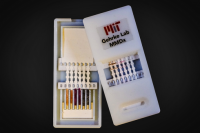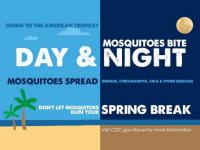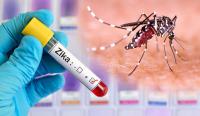-
NSF awards $1.7 million in rapid response grants to study Zika virus
Zika, discovered in Uganda in 1947, has been documented since the 1950s along the equatorial belt from Africa to Asia. In 2014, the virus spread eastward to French Polynesia, and in 2015 to Mexico, Central America, the Caribbean (including Puerto Rico) and South America, where the outbreak continues. To find new ways of halting the spread of Zika — fast becoming a major public health threat — the National Science Foundation (NSF) Division of Environmental Biology’s Ecology and Evolution of Infectious Diseases (EEID) Program has funded nine rapid response, or RAPID, grants totaling $1.7 million.
-
-
A new paper-based test for the Zika virus
A new paper-based test developed at MIT and other institutions can diagnose Zika virus infection within a few hours. The test, which distinguishes Zika from the very similar dengue virus, can be stored at room temperature and read with a simple electronic reader, making it potentially practical for widespread use.
-
-
Israeli tech ready to take on Zika-carrying mosquito
The mosquito-borne Zika virus, according to new reports, is even more dangerous than first believed. While better information about prevention has helped slow the rate of infection in some areas, the health community is still urgently searching for a vaccine or drug treatment. The world seeks a medical intervention, but Biofeed’s no-spray green product targets the insects directly.
-
-
Cellphone-sized device detects the Ebola virus quickly

The worst of the recent Ebola epidemic is over, but the threat of future outbreaks lingers. Monitoring the virus requires laboratories with trained personnel, which limits how rapidly tests can be done. Now scientists report in ACS’ journal Analytical Chemistry a handheld instrument that detects Ebola quickly and could be used in remote locations.
-
-
Infectious outbreaks must be combatted strategically: Experts
New funding is not enough to guarantee success against emerging infectious diseases around the world. Rather, good governance, a long-term technology investment strategy, and strong product management skills are essential. As momentum builds for an international effort to develop drugs and vaccines for emerging infectious diseases, experts examine U.S. biodefense programs to understand approaches that might work and developed a global strategy for countermeasure development.
-
-
Resistance-proof antiviral can treat many diseases
Scientists and health officials are marshalling forces to fight Zika, the latest in a string of recent outbreaks. Many of these efforts target that virus specifically, but some researchers are looking for a broader approach. The new strategy aims to fight a wide range of viruses that appears to be safe in vivo and could evade a virus’s ability to develop resistance.
-
-
Congress’ inaction hobbles U.S. preparation for a major Zika virus outbreak: Experts

Despite dire predictions that the Zika virus could affect much of the United States including large cities this summer, the country is unprepared, and the financial and moral consequences could be significant. Earlier this year, President Barack Obama requested $1.86 billion for surveillance, mosquito control, research and health services, but Congress has not approved the funding. In the absence of Congressional action, the president reallocated $589 million of designated Ebola funds to Zika preparedness, research and the creation of response teams. “The nation’s state of preparedness is compromised by Congress’s inaction on supplemental funding and the weak capacities and powers of states and localities,” two public health experts say.
-
-
Zika virus “scarier than we initially thought”: U.S. health officials

Dr. Anne Schuchat from the Centre for Disease Control and Prevention (CDC) said the Zika virus is more of a threat than previously thought. Speaking at a White House press conference, she said there was potential for the virus to spread to more U.S. states than experts first believed. “Most of what we’ve learned is not reassuring. Everything we look at with this virus seems to be a bit scarier than we initially thought,” she told reporters.
-
-
Novel alignment-free sequence descriptors in Zika virus characterization
The recent epidemic of Zika virus infections in South and Latin America has raised serious concerns on its ramifications for the population in the Americas and spread of the virus worldwide. Researchers explain their research on computer-assisted approaches toward surveillance and consequent design of drugs and vaccines to combat the growth and spread of the Zika virus.
-
-
Limited awareness or concern about Zika virus in U.S.

A recent survey by the Associated Press-NORC Center for Public Affairs Research finds that three-quarters of Americans who have heard at least a little about the Zika virus are aware that the virus is linked to birth defects in babies born to infected mothers. However, the survey found that most Americans are unclear about the availability of tests to diagnose Zika and whether or not preventative vaccines and effective medicines exist to treat it.
-
-
Texas hospitals developed first rapid tests for Zika virus

Two major Texas health centers have developed Scientists at two Texas hospitals — Texas Children’s hospital and Houston Methodist hospital – have developed what they describe as the U.S. first hospital-based, rapid test for the Zika virus. The test can yield results in a matter of hour.
-
-
Ebola crisis provides framework for how to respond to outbreaks like Zika virus
As world leaders grapple with containing the Zika virus, the Ebola epidemic in West Africa provides valuable lessons for how to respond to other infectious disease epidemics, according to a just-published policy report. Rebuilding local health care infrastructures, improving capacity to respond more quickly to outbreaks and considering multiple perspectives across disciplines during decision-making processes are among the key recommendations the authors propose.
-
-
Losing the fight against antibiotic resistance

Antibiotics have been used in medicine since the 1930s, saving millions of lives. Two decades later, they were introduced into agricultural practices. A growing awareness of the antibiotic resistance crisis and continued debate over who and which activities are most responsible led to the EU calling for the use of antibiotics in non-therapeutic settings to be phased out. Tackling antibiotic resistance on only one front is a waste of time because resistant genes are freely crossing environmental, agricultural and clinical boundaries, new research has shown.
-
-
DHS response plan to the Zika virus
The Department of Health and Human Services (HHS), which includes the Centers for Disease Control and Prevention (CDC), is the U.S. government’s lead for efforts to respond to the Zika virus. As the White House announced last Monday, the president is also seeking more than $1.8 billion in supplemental funding from Congress to address the virus and our government’s response efforts.
-
-
WHO “must reform” to deal effectively with pandemics like Zika
The World Health Organization’s (WHO) emergency response capabilities are “lacking” and will put thousands of lives at risk if they are not reformed now, a UN panel, convened in the wake of the Ebola crisis, said. “This may be the last opportunity to ensure the WHO is empowered” to build an effective emergency response capacity, an advance unedited copy of the UN panel’s report warned.
-
- All
- Regional
- Water
- Biometrics
- Borders/Immig
- Business
- Cybersecurity
- Detection
- Disasters
- Government
- Infrastructure
- International
- Public health
- Public Safety
- Communication interoperabillity
- Emergency services
- Emergency medical services
- Fire
- First response
- IEDs
- Law Enforcement
- Law Enforcement Technology
- Military technology
- Nonlethal weapons
- Nuclear weapons
- Personal protection equipment
- Police
- Notification /alert systems
- Situational awareness
- Weapons systems
- Sci-Tech
- Sector Reports
- Surveillance
- Transportation
Advertising & Marketing: advertise@newswirepubs.com
Editorial: editor@newswirepubs.com
General: info@newswirepubs.com
2010-2011 © News Wire Publications, LLC News Wire Publications, LLC
220 Old Country Road | Suite 200 | Mineola | New York | 11501
Permissions and Policies
Editorial: editor@newswirepubs.com
General: info@newswirepubs.com
2010-2011 © News Wire Publications, LLC News Wire Publications, LLC
220 Old Country Road | Suite 200 | Mineola | New York | 11501
Permissions and Policies
